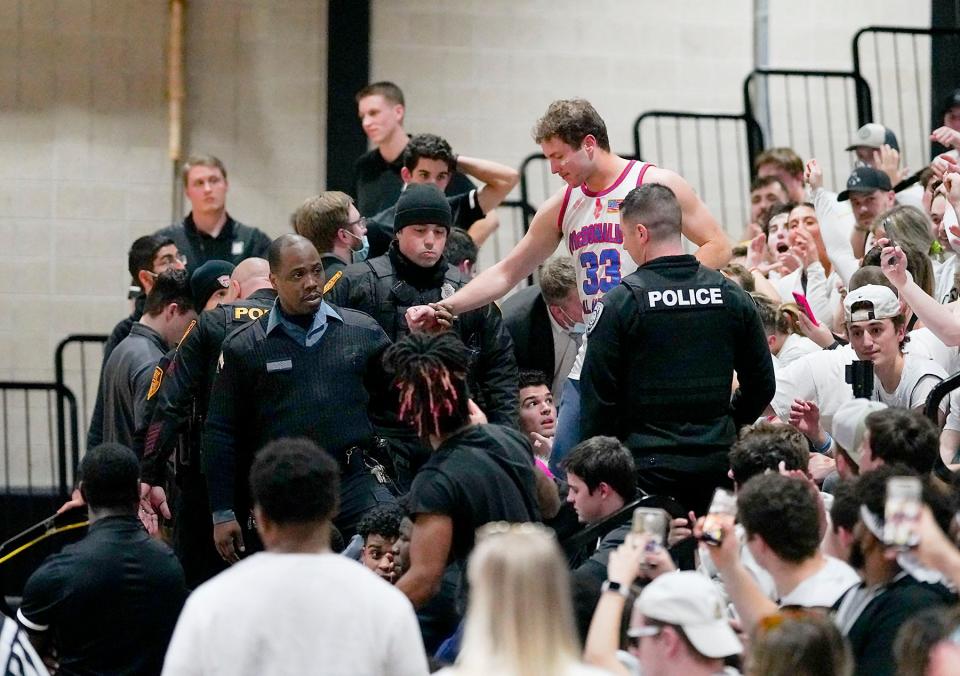'It seems to be more extreme': Violent sports fans are causing alarm at every level
On Saturday, a violent brawl in the stands at a Mexican soccer game left more than two dozen people injured and led to 14 arrests.
On Sunday, an unidentified fan told an Iowa basketball player to kill himself after he missed a free throw near the end of a loss to Illinois.
On Monday, Los Angeles Lakers guard Russell Westbrook talked about not wanting to bring his kids to NBA games, because of the terrible things they'll likely hear fans say about their dad.
And on Tuesday, a fight between spectators delayed the Northeast Conference men's championship game between Bryant and Wagner.
"Athletic competition should bring out the best in us," the league's commissioner, Noreen Morris, said in a statement the next day. "Sadly, we didn’t see that last night."
The four-day stretch prompts a question that has been simmering at all levels of sports for decades but come to the forefront over the past year, as fans have returned to arenas and stadiums after the worst of COVID-19.

Are sports fans getting more aggressive, more abusive, more downright violent?
To Karissa Niehoff, the chief executive officer of the National Federation of State High School Associations, it sure seems that way.
"We've noticed, anecdotally, a rapid rise" in instances of aggressive or abusive behavior at high school sporting events, she said in a phone interview.
"It seems to be more frequent, and it seems to be more extreme," she continued. "So it’s not just somebody was swearing at the official. We’re now having bench-clearing brawls at a greater number than we’ve seen. Physical assaults. ... We’re just seeing, more commonly, a more extreme example of bad sportsmanship."
There is little public data available on the rates of arrests or ejections at sports venues, according to Murray State professor of psychology Daniel Wann, who has been studying the issue for more than three decades. And even the most comprehensive datasets couldn't account for every vulgar taunt directed at an athlete, or stray object thrown.
So it's difficult to say, empirically, whether instances of fan misbehavior have increased over a certain period of time, Wann said. But theoretically, it would make sense.
"Civility is going down in our society. Empathy is going down in our society," Wann said. "Why would you expect anything different in the stands?"
Wann described the bleachers at a sporting event as a unique tinderbox for aggression. There are two diametrically opposed groups of people, many with a deep emotional attachment to the performance of their team. Large crowds, which can lend themselves to mob mentalities or embolden individual fans to go rogue, with a belief that they'll never be caught or identified by security.
And then, in many cases, you've got alcohol.
"There's a strong connection between drinking and fan misbehavior," Harvard professor Henry Wechsler said in 2003. "When you win, you're supposed to drink to celebrate, and when you lose, you're supposed to cry in your beer."
It was on Ten Cent Beer Night, after all, that fans stormed the field in one of the most infamous incidents of fan aggression at a baseball game in Cleveland in 1974 – which also illustrates that fan misbehavior is hardly a new phenomenon.
Nor is it limited to certain sports, or certain levels of competition.
After fans returned to sports venues en masse last year, the NBA saw a string of abusive and aggressive incidents, from popcorn being dumped on Westbrook's head to a water bottle being thrown at Kyrie Irving. At a Tennessee football game, fans threw a variety of objects – including a mustard bottle and a golf ball – onto the field. And in the United Kingdom, the country's "football policing unit" reported a 47% increase in arrests at soccer games this season over the same period in 2019-20.
Meanwhile, at the high school level, Niehoff ticked off a number of recent incidents in a newsletter distributed last month, from a referee being knocked unconscious at a tournament to a student shouting racist comments at an opposing player.
Even a youth basketball league in the small town of Rome, New York, had to cancel its season last month after a series of incidents involving parents in the stands.
"I think we have lost our way a little," Rome Parks and Recreation Department Deputy Director Ryan Hickey told league stakeholders in a message, according to the city's local newspaper, The Rome Sentinel.
While the fan incidents in the pros tend to draw more national media scrutiny, Niehoff said outbursts at the amateur level are having severe consequences. She said the high school sports landscape has lost an estimated 50,000 officials and referees over the past three years – and that, when surveyed, their most common reason for leaving is parent and fan behavior.
"People are angry. And they’re bringing that anger, for any number of reasons, into the high school gym," she said. "We cannot have it."
Wann wonders if maybe the rash of fan incidents since COVID-19 could stem, in some way, from the culture of abuse and aggression that exists online. He noted that many fans likely got accustomed to watching games at home, where they could lash out without repercussion or make hateful comments behind the anonymity of their keyboards.
"Most of the time, people are less likely to do those things in person than they are in private, because in private, they can get away with it," he said. "Maybe some of these fans kind of forgot that they’re not in private anymore."
Contact Tom Schad at tschad@usatoday.com or on Twitter @Tom_Schad.
This article originally appeared on USA TODAY: Sports fans more violent, abusive since returning after worst of COVID

